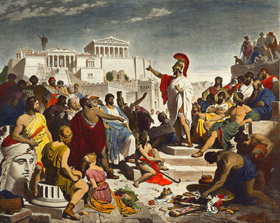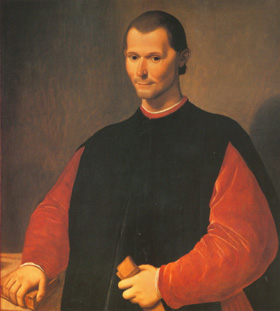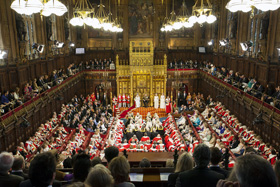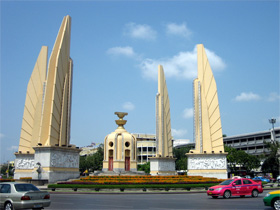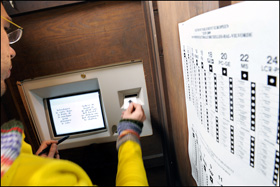What will democracy be like in a hundred years?
A south Sudanese voter casts his ballot
in the referendum in Juba, south Sudan
(no votes) |
(0 votes) |
Doctor of History, Professor of the Comparative Political Studies Department at MGIMO-University, RIAC expert
Democracy is a polity when a group of people governs themselves, according to a trivial definition. Several points are important in this regard. First, there can be a host of polities that can be called democracy. There is no universal definition of democracy. Second, this is a polity with a group of people at power, which rules out tyranny. Third, governance may be delegated, including to an individual, but delegating something suggests that one has the right to get it back via a certain procedure, after some time or due to a breach of a contract.
Fundamentals of classical democracy
Democracy is a polity when a group of people governs themselves, according to a trivial definition. Several points are important in this regard. First, there can be a host of polities that can be called democracy. There is no universal definition of democracy. Second, this is a polity with a group of people at power, which rules out tyranny. Third, governance may be delegated, including to an individual, but delegating something suggests that one has the right to get it back via a certain procedure, after some time or due to a breach of a contract.
A sensible use of the term “governance” assumes the principle of adequate complexity, in other words, a governing system must be as complex as the system which is governed.
When we speak of democracy we imply that those who govern and those who are governed are human beings. Human brain is an extremely complicated system consisting of billion of neurons and each is as powerful as a state-of-the-art computer.
Human brain can manage thousands of processes simultaneously but only in cases when it does this unconsciously. Consciously, a human can manage as much as two or three processes at a time, and only in very exceptional cases. This is common knowledge, but very serious conclusions regarding the nature, opportunities and limitations of democracy can be drawn from it.
First, no one will task a group of individuals with managing the situation when there is a serious shortage of time. It is well-known that there should only be only one captain on the ship to make the sailing successful because the sea voyage is full of surprises and unpredictability. Certain restrictions are imposed on democracy as any democracy must allow for a possibility of introducing a state of emergency. Therefore, democracies will be classified in accordance with institutional instruments of introducing a state of emergency.
Second, Robert Michels’ axiomatic law of oligarchy says that any democratic hierarchy inevitably turns into oligarchy. Hence it is necessary to separate power into at least three branches – the executive, the legislative and the judicial. They must be independent of each other otherwise democracy turns into a farce. The independence of each branch of power is ensured by the rules of their communication with each other and limitation of their terms in office, or else there start to emerge social influence networks, bringing the authorities’ independence to nought.
These are the main provisions of the classical theory of democracy. A 100-year forecast regarding the development of a social institution can only be made if it is possible to trace back the history of its development over quite a long period of time.
Lessons of the past
Democracy originated in Greek poleis (cities) with small population, isolated seaside location in valleys between mountains and lack of natural resources necessary for survival. Therefore, shipping and maritime trade were the only ways to survive. Limited timber resources did not allow the building of large vessels. Typically, vessels could accommodate 20-30 persons. During storms their lives depended on their unity, ability to fulfil orders and skills of a helmsman. This is how first units of democracy originated.
Everybody’s participation in the governance process under the leadership of elected heads was the principle of this democracy. Officials, whose duties required no extraordinary skills, were replaced by draw. There were quite a lot of offices so that everybody could become an official in accordance with the principle of rotation. This was determined by a typical city’s population of 10,000 people. Aristotle said that a city should have an area small enough for everyone to hear the voice of heralds calling for meetings. A small number of citizens allowed for low transaction costs during interaction. When cities grew larger, the polis democracy collapsed.
The next stage in the development of democracy was the political system of Italian medieval cities. This system grew out of the Roman model. Rome itself had never been a democracy, it was a senate aristocratic republic with special political institutions (plebeian tribunes) containing aristocrats.
The Italian cities’ political construction left very much to be desired: a small number (2-10) of consuls, usually elected for a year, was in power. This model with no division of powers produced very bad results causing continuous war for power between influential families. But there was one exception - the Republic of Venice.
Usually Venice is regarded as a symbol of oligarchy. But this is not so in fact. This was a democracy of nobles; there were about 3,000 of nobles, or five percent of the republic’s population, which was almost equal to the percentage of citizens living in the Golden Age of the democratic Athens, with slaves, women and metics excluded.
Venetian political set-up was notable for an extremely complicated institutional structure. All nobles were members of the Great Council of Venice which was equivalent to the polis’ demos. They chose the Senate, i.e. the republic’s broad government, the Council of Forty, a judicial authority, a lifelong doge, who reigned but did not rule (the latter’s election procedure was fantastically complicated). Doges were under constant supervision of the Council of Ten, the republic’s security authority, whose members were elected for a one-year term.
Doges were supposed to have assistants; they, along with the Council of Ten, made up Signoria, the government in a narrow sense. Institutions, which were supposed to make decisions, were configured in a special way for each serious case. It is difficult to describe Venice’s political structure since there were a big number of important nuances. What is important is that exclusively complicated mechanism worked without a hitch for more than 600 years. During this period Venice wasn’t shaken by any revolutions or uprisings despite the seemingly oligarchic governance. The principle of adequate complexity was at work – the complexity of the system of governance corresponded to an extremely difficult political situation, which was inherent in the republic.
This long description was necessary to demonstrate the maximum sophistication of political tools that can be developed by human brain. Modern political systems are not even a patch on it.
Modern democracy traces its roots to the principles of the English Parliament. Initially, the idea was very simple – class representatives were elected for controlling the monarch’s state expenses. This system got more complicated within circa 500 years; it obtained new functions such as the election of the government by the parliament and the parliament’s control over most spheres of the government’s activity. But the basic principle of the parliament’s absolute power has remained steadfast since the 1640-1648 revolution.
The American Revolution gave birth to another system in which the trias politica principle (the principle of the separation of powers) was realised at its utmost: a president elected by citizens, a two-house Congress consisting of the House of Representatives and the Senate and the Supreme Court. The US Constitution provided a model example of federalism: the states had their own governors and their own representative authorities; the powers of the federal bodies and states’ bodies were clearly differentiated.
In fact, the structure of the majority of existing today democracies derives from the Westminster system and the principles of the US Constitution. The exceptions are: France with presidential-parliamentary system; Switzerland which broadly uses referendums as an integral part of a federative system and a number of countries which introduced more subtle distinctions.
Representation was the principle of all political systems established after 1789 (except for Switzerland) functioning. It is impossible to ensure direct democracy in a country with a multi-million population.
In Switzerland this is ensured by a mechanism thanks to which a large number of cantons enjoy broad powers and the role of the central government is minimal.
Obstacles hindering democracy
The following circumstances are main obstacles hindering democracy:
- Huge transaction costs of elections, which are held once in several years because of this;
- The citizens’ inability to directly affect the government’s political course between the elections;
- The citizens’ incompetence in the majority of issues which are under the jurisdiction of the government, parliament and judicial system, including the most important such as war and peace.
Consequently, speaking about the future of democracy it is necessary to propose ways to fight these weaknesses.
Combating transaction costs seems to be the easiest problem to solve. Actually, voting can already be conducted through the Internet or by using cell phones which almost everybody has. But several technical issues arise in this regard: how to ensure that the voting is held anonymously, how to identify an individual who has the right to vote?
There are solutions to it, for example, one can enter the voting system via a biological identification of either his/her iris or finger prints for instance. These technical problems will be resolved in the nearest future without any doubts. Electronic voting via cell phones will sharply reduce transaction costs and will allow us to get back to the times of Greece’s poleis with the planet becoming an area where a voice of a herald will be heard in its every single corner.
At the same time the issue of electoral fraud will also be resolved. But this approach does not solve the problem itself. It only makes voting easier from the technical standpoint. Preliminary information is needed to make deliberate choice. This information can also be received via the Internet or smart-phones. But how can personal data be protected then since there have been numerous and well-known cases of leaks?
Let us suppose that the conditions for holding continuous referendums have been created. What will be the consequences? The thing is that issues of state governance can be divided into three categories: the issues that concern everybody and that can be discussed by everybody; the issues requiring special knowledge for discussions; and the issues dealing with state secrets.
The first category is singled out quite easily. But the question arises as to how to find the solution? Citizens who are interested in a specific problem do not always know the legal ways it should be solved with. Usually they are only able to make their choice from available alternatives and can rarely come up with constructive proposals. A new democratic institution should involve citizens in electronic voting first on a draft law in general and then on each amendment separately. As for the rest, the standard parliamentary scheme will be applied. This is how the parliament will be expanded “electronically.”
But still the question remains about what to do with the second category of issues which are not clear for most citizens due to their intellectual complexity or necessity to have professional knowledge to understand it?
In fact this issue is acute in modern parliamentary system as well, because members of parliament are common citizens with quite limited knowledge who, though, have to deal with complicated matters. To resolve these issues, the parliament’s institutional structure should be made more complex. It is necessary to have a panel of experts which could help parliamentarians. And this is what most parliaments do. The number of experts in committees is limited, but it could be significantly increased through the use of the Internet.
Here is another peculiarity of dealing with the second category of problems: there must be a special body that would address differently the problems of the first and the second categories. Apparently, it should be something like Russia’s Public Chamber.
This body should evidently consist of MPs elected from corporations and parliamentarians elected by ordinary citizens. The employees of this body should be paid big salaries to prevent corruption.
The super-presidential republic will unlikely exist more than 15-20 years. It is not because of a colour revolution possibility, but due to tasks whose complexity by far exceeds the institutional complexity of the system of governance.
It seems that the significance of a federative aspect in the democratic system of the future will be inevitably growing. The diversity of social environments is huge, and both laws and law enforcement practices must be adapted to this diversity. In this regard, the European Union can be considered a model. Each EU member state has its laws but there is a set of common rules which are applied everywhere. Even now the European Union somehow reminds the Republic of Venice. Bureaucrats in Brussels have taken upon a heavy burden of elaborating a host of technical regulations and by-laws of the pan-European significance.
The decisions on standards regarding the quality of products sold on the EU markets are to a large extent defined not only by the living standards but by business conditions as well. At the same time the EU bureaucrats are not directly accountable to citizens. The idea of setting up a public chamber called upon easing tensions arising in the society might work here; to this end, an institutional structure will have to be complicated.
Democracy is a model of collective thinking. It is impossible without negotiations, and new mechanisms of reaching an agreement between the society members can radically change the structure of democratic institutions.
Speaking about Russia, its political system will have to go through significant changes. The super-presidential republic will unlikely exist more than 15-20 years. It is not because of a colour revolution possibility, but due to tasks whose complexity by far exceeds the institutional complexity of the system of governance.
The president’s excessively busy schedule and tons of work to do will for sure affect the quality of governance. The power will be substantially decentralised with its considerable part transferred to the Federation’s constituent entities and municipalities. The promotion of the “electronic government” concept will reduce corruption. Introduction of the minister’s responsibility before the parliament and direct parliamentary control over the governmental activity can be named among those urgent issues necessary to address in order to bring changes to the structure of power.
But any attempts to make predictions in 100-year-long perspective inevitably result in mistakes. The principle of representation, which has been dominating in the democratic policy for more than 200 years, seems to have no alternative. But new futurological projects (even though rather crazy) challenge this principle. The further biological progress might change our views about the nature of society and human thinking.
Ultimately, democracy is a model of collective thinking. It is impossible without negotiations, and new mechanisms of reaching an agreement between the society members can radically change the structure of democratic institutions.
More comprehensive understanding of the principles of thinking might facilitate direct contacts between people holding different views by eliminating suspicions on which mistrust is built and will considerably increase the level of tolerance within the society. The detailed study of cultural differences will make the mutual understanding between the cultures a much more natural process thereby preventing religious and ethnic conflicts. In peaceful environment democratic institutions will become more stable as well.
But this, however, is an optimistic scenario. Currently we are witnessing a lot of signs of a comeback to the middle-aged thinking; we see relations between the states exacerbating due to the fight for natural resources and confrontations growing stronger all over the word. And hardly will the competition between the states reduce. This raises a serious question of the role of democracy in the world order, and the answer has yet to be obtained.
It is difficult to say how far the world can go in the struggle for democracy. Hopefully, the tolerance will get an upper hand over aggressiveness; this scenario would be the most desirable one.
(no votes) |
(0 votes) |


